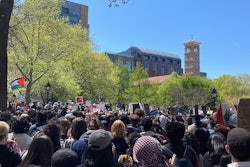Many experts believe that the Biden administration’s plan for student loan forgiveness, which offers $10,000 of debt relief to most borrowers and $20,000 to Pell Grant recipients, is dead in the water at the conservative-dominated Supreme Court. Diverse readers aren’t more optimistic, with nearly 2/3 predicting that the policy would be terminated in a recent poll. But a recent amicus curiae brief filed by two conservative law professors might offer Republican-appointed justices a reason to issue a surprise decision.
Like many conservatives, the brief’s authors, Samuel L. Bray, the John N. Matthews Professor at Notre Dame Law School, and William Baude, a professor at the University of Chicago Law School, don’t believe that President Joe Biden has the authority to cancel student debt. But they also don’t believe that many of the plaintiffs have standing—the experience of direct harm that would give them the right to sue in the first place.
 Michael San’Ambrogio, professor and senior associate dean for faculty and academic affairs at Michigan State University
Michael San’Ambrogio, professor and senior associate dean for faculty and academic affairs at Michigan State University
Several of the states involved in the cases are claiming that they will experience harm from a loss of fees that would have been paid to student loan servicers. Baude and Bray focus on the most prominent of these, Missouri and the Missouri Higher Education Loan Authority (MOHELA). Missouri claims that MOHELA is synonymous with the state and that a projected decrease in funds would prevent MOHELA from making legally required payments into a state fund.
Baude and Bray reject this, arguing that MOHELA is distinct from the state of Missouri legally and financially. They point out that MOHELA has the ability to sue and be sued. (Indeed, if MOHELA itself was the plaintiff in this Supreme Court case, it would likely have standing, the authors say.) Baude and Bray further argue that whether decreased revenues will cause MOHELA to miss a payment to the state fund is speculative and that MOHELA is likely to miss their payment anyway for reasons unrelated to loan forgiveness.
The brief also tackles other arguments that states have made, like that loan forgiveness would decrease tax revenue or harm the health and well-being of citizens. Baude and Bray counter that the states could alter their tax policies if they so choose.
San’Ambrogio believes that these arguments are powerful.




















